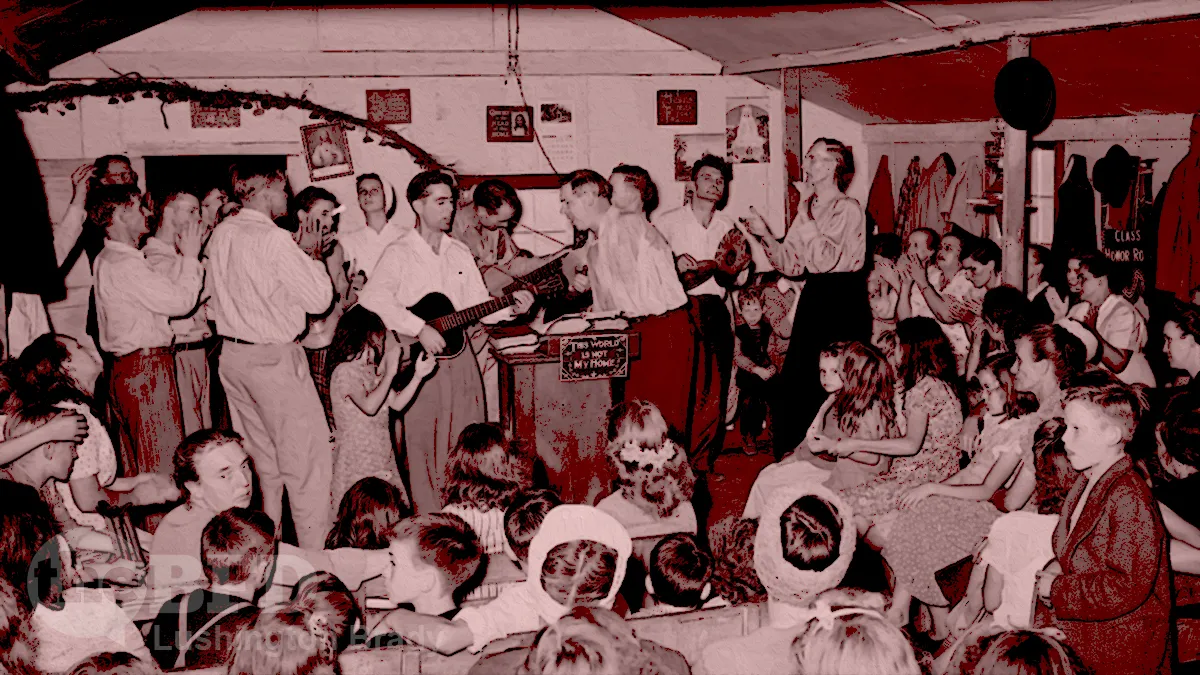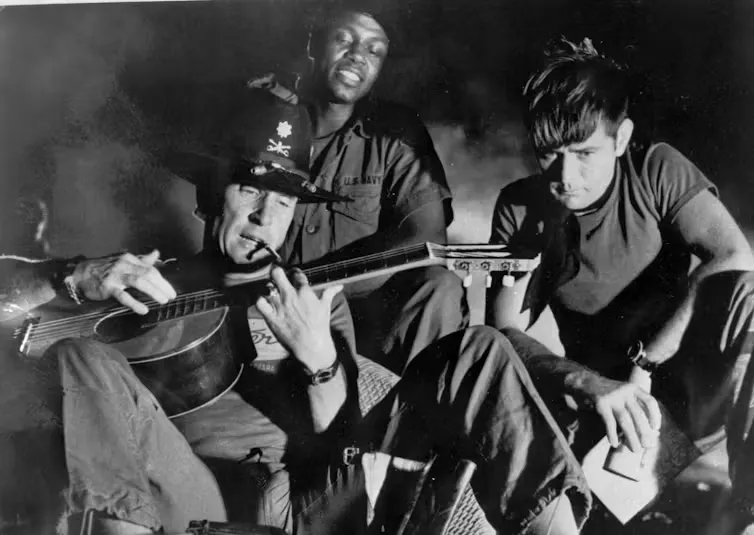Table of Contents
Despite the fact that Gene Simmons briefly majored in theology at college, religion is not generally something associated with rock group KISS, except in the negative (a long-standing, if false, claim is that their name is anagrammatic of “Knights In Satan’s Service”). Yet, KISS were more on the money than they knew, when they sang “God Gave Rock’n’Roll to You” (although they didn’t write the song: it was a cover of an Argent song).
For all that hellfire preachers have spent decades railing against “the Devil’s music”, rock’n’roll has deep roots in Christianity. Most particularly the seemingly most-unlikely branches of the faith, Pentecostal and Baptist Christianity. It’s not coincidental that evangelist Jimmy Swaggart’s cousin, Jerry Lee Lewis, was a rock’n’roll pioneer.
Jerry Lee Lewis, along with Elvis Presley, Johnny Cash, Little Richard, B B King and others were all raised in or regularly attended Pentecostal services in their formative youth. Rock and roll – the soundtrack of rebellion and the music of side-burned delinquents and teenage consumers – owed a surprising debt to Holy Ghost religion. It is true that Pentecostalism formed just one of the tributaries that fed the raging river of rock and roll, but the importance of the spirit-filled faith to the new hybrid genre was significant.
Even today, the “happy-clappy” Pentecostals are synonymous with singing as worship. Many feature full rock’n’roll bands at services.
The black pioneers of rock’n’roll were especially associated with religion. James Brown, the “Godfather of Soul”, learned a lot from his religious upbringing.
Brown spent his at the United House of Prayer church in Augusta, Georgia. Its flashy leader, Sweet Daddy Grace, wore a cape and was ‘like a god on earth’. When Grace died in 1960, Ebony magazine called him a “Cadillac-riding materialist” and “a brown-skinned P T Barnum who cracked the whip in a circus of gaudy costumes, wildly gyrating acrobats and brass bands that played as if God were a cosmic hipster”. Such criticism mattered little to the devout. In Brown’s estimation, “Those folks were sanctified.” The Pentecostal saints “had the beat … Sanctified people got more fire”.
That fire and the beat certainly inspired Ray Charles. The brilliant pianist was a great admirer of sanctified music and especially black quartets. Charles admitted to lifting material from a song called “You Better Leave That Liar Alone” for his decidedly secular song “You Better Leave That Woman Alone”. The most obvious and potent of these retooled spiritual numbers was his 1954 smash hit “I’ve Got a Woman”, co-written with Renolds Richard. The pair used “It Must Be Jesus” by the Southern Tones for inspiration.
Of course, Christianity has a long if sometimes ambivalent relationship with music. As I’ve written before, music is often an expression of the divine in Christianity and its Jewish antecedents. The most famous Hebrew king, David, was a musician. Yet, even David could get carried away by music and whirl himself into a frenzy that horrified his wife, Michal.
The sort of orgiastic religious frenzy that had filled David was commonplace in Pentecostalism, with its speaking in tongues and suchlike. Such joyful, exuberant religiosity inspired many early rock’n’rollers.
In his youth, [Little Richard] said he liked the fiery Pentecostal services the most, where enthusiasts spoke in tongues and did the ‘holy dance’. He had long-lasting memories of the singing evangelist Brother Joe May and the Pentecostal guitarist Sister Rosetta Tharpe.
But Christianity and the lifestyle of a music star weren’t always easily reconciled. Pre-rock’n’roll country singer Hank Williams often reflected on the tension between “Saturday night and Sunday morning”.
Other stars in the early years of rock and roll – many with connections to Pentecostal communities – were equally consumed by guilt. Johnny Cash, who attended Church of God services in Dyess, Arkansas, struggled with alcohol and amphetamines. Little Richard, too, was convinced that his stardom – and his homosexuality – would put him on the road to perdition. Somewhere along the way, he had strayed from the path of righteousness […]
Jerry Lee felt the sting of such rebukes. Elvis Presley, who attended the Memphis First Assembly of God church before fame made that impossible, was also hurt when Southern Baptists, Catholics and Methodists lined up to denounce his stage shows and his ‘wicked’ music. Billy Graham, America’s most famous preacher, claimed that the King of Rock and Roll’s fame was due to the “mystery of iniquity”, which was “ever working in the world for evil”.
Unsurprisingly, Jerry Lee, caught between God and the Devil, was particularly vocal about his burning sense of guilt. In 1979, critic and musician Robert Palmer asked ‘The Killer’ if he believed he was going to hell for playing rock and roll. “Yep”, Lewis replied confidently. “I know the right way,” he said. “I was raised a good Christian. But I couldn’t make it … Too weak, I guess.”
Others decided to repent.
While on tour with Gene Vincent and Eddie Cochran in Australia in 1957, Richard decided to turn his life around. When his band mates doubted his sincerity, Richard tried to convince them by tossing $8,000 worth of diamond rings into a river. He took the Russian launch of Sputnik in 1957 to be a clear sign of the apocalypse. He planned to enroll in a Seventh-day Adventist seminary […]
Other lesser-known rock and roll performers like Jimmie Rodgers Snow ditched the stage for the Pentecostal pulpit. The son of country legend Hank Snow, he signed a record contract with RCA, making minor, innocent hits like “How Do You Think I Feel?” (1954) and “The Rules of Love” (1958) and toured with Buddy Holly, Bill Haley and His Comets and Elvis. Snow told the latter that he was contemplating a Pentecostal preaching career the same year that Richard made his turnaround in Australia.
Yet, if King David’s wife was disgusted by his frenzied singing and dancing, like a true rock’n’roller, David was unrepentant. “I will celebrate before the Lord,” he said. “I will make myself yet more contemptible than this, and I will be abased in your eyes. But by the female servants of whom you have spoken, by them I shall be held in honor.” Elvis or the Killer himself couldn’t have put it better.









